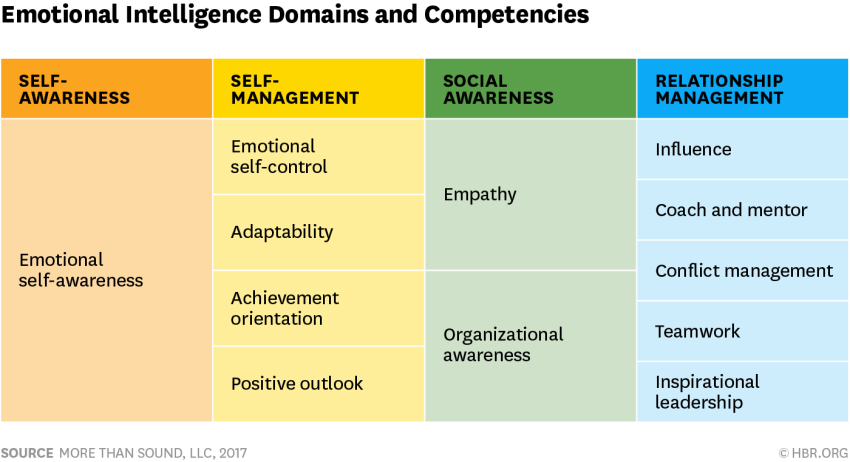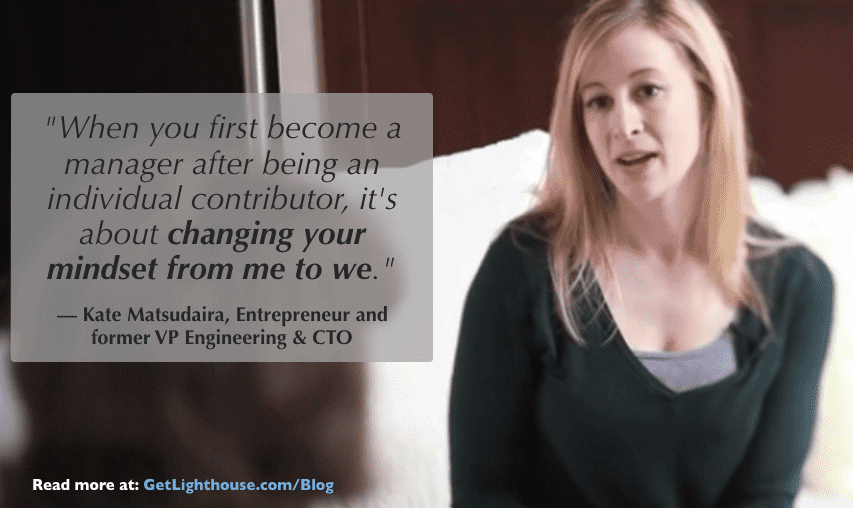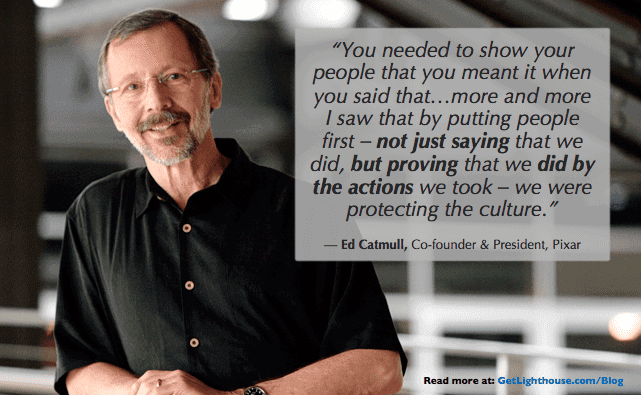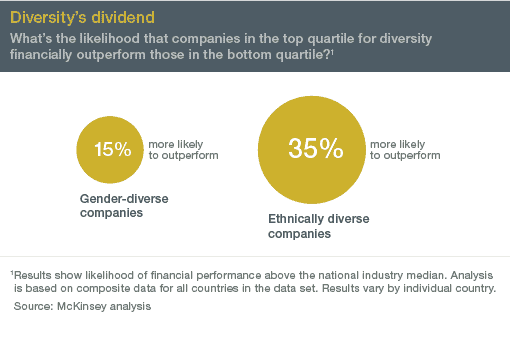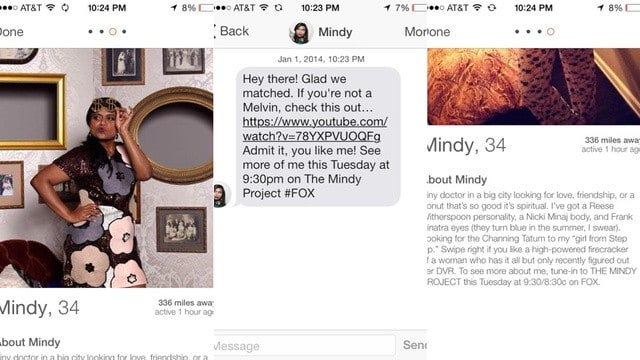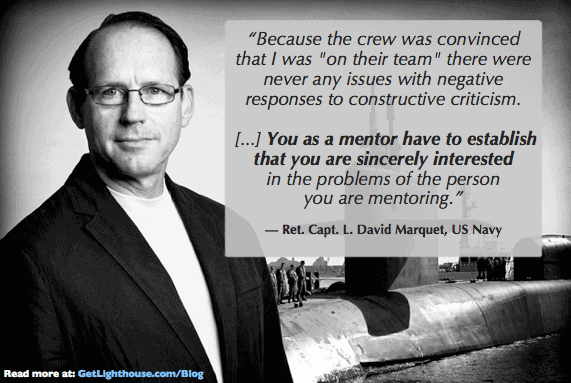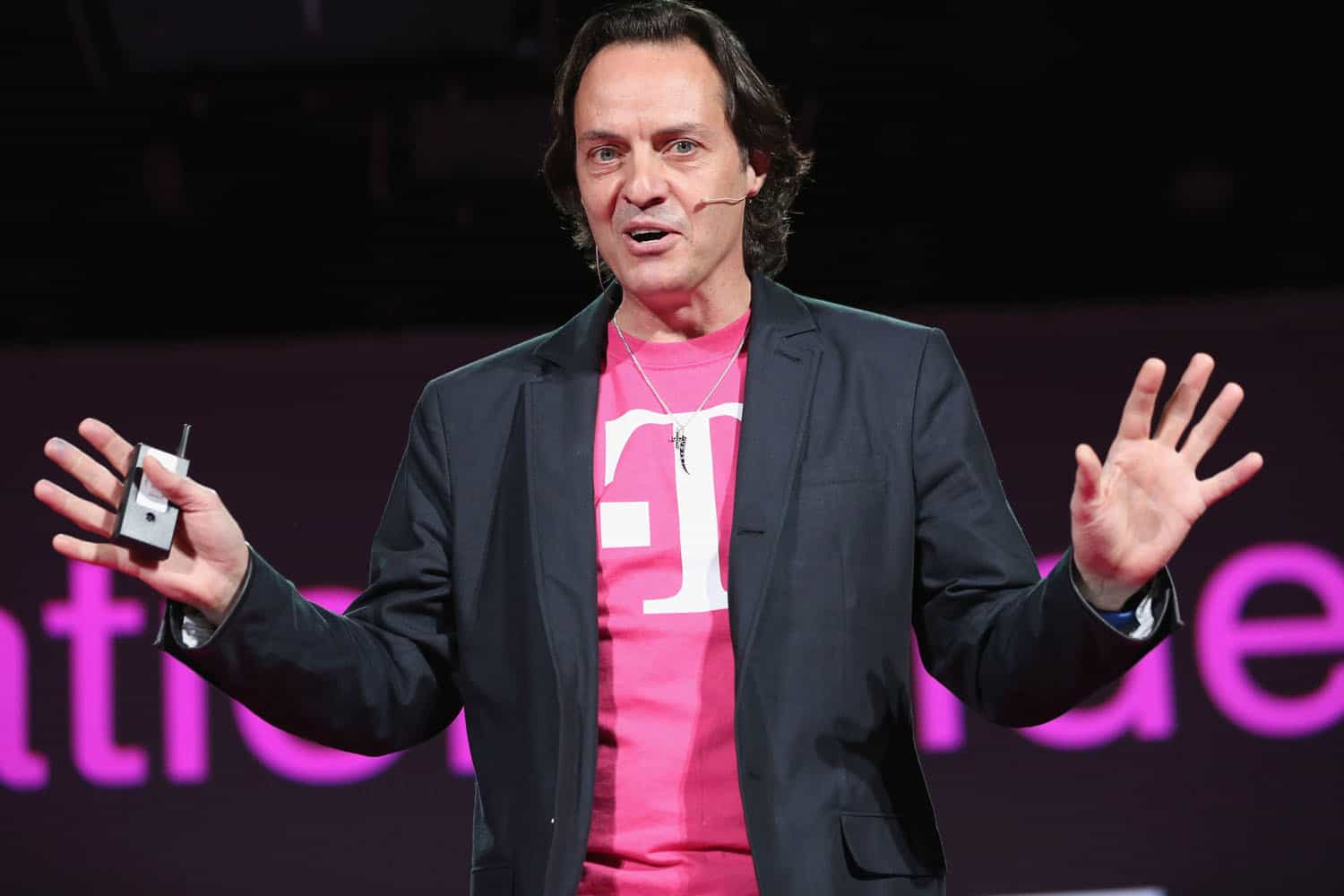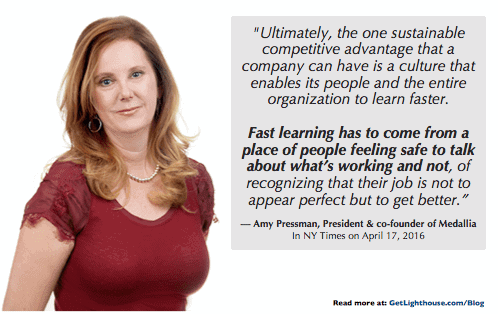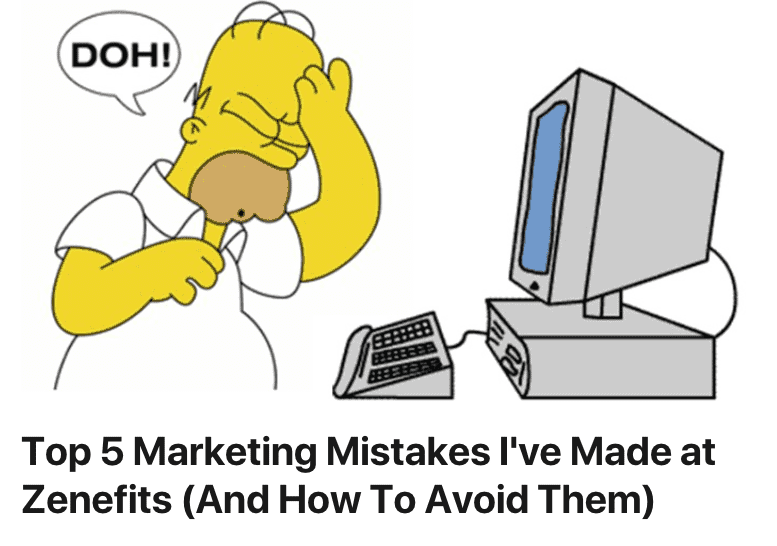What makes an effective leader?
Typical answers include: a high IQ, a "hustle" attitude, and a big personality.
But today, many experts are embracing another answer: high emotional intelligence.
The concept of emotional intelligence or the emotional quotient (EQ) is relatively new. But, it's the skill separating an average manager from an effective leader that teams trust.
What is EQ?
There are many attempts to treat EQ like IQ; by defining it as a fixed measurement that you're born with.
But recently, it's been defined as the ability to recognize and manage emotions within oneself and others.
The Harvard Business Review suggests that emotional intelligence consists of four key domains. Each including a set of learned, and learnable, capabilities:
Meanwhile, psychologist Daniel Goleman believes that EQ is especially crucial for business leaders:
"The most effective leaders are all alike in one crucial way: they all have a high degree of what has come to be known as emotional intelligence...Without it, a person can have the best training in the world, an incisive, analytical mind, and an endless supply of smart ideas, but he still won't make a great leader.”
How Top Leaders Express Emotional Intelligence
Researchers Vipin Mittal and Ekta Sindhu agree with Goleman's statements. Their report, Emotional Intelligence and Leadership, concludes that a high EQ differentiates a elite and effective leader from a mediocre one.
For four years, they observed and interviewed "highly effective senior managers and executives in prominent Fortune 500 companies, federal agencies, nonprofits and the military.”
They asked questions on how these managers overcame leadership challenges while motivating their teams.
Mittal and Sindhu noticed that great managers were self-aware, empathetic, open-minded, and optimistic. They could handle complicated social interactions like, managing a lousy boss and disciplining an employee, while maintaining high team morale.
However, the researchers didn't just explain how leaders express their high EQs. They also revealed the pitfalls of high emotional intelligence, and how it can hinder leadership capabilities.
Here are some of our favorite takeaways and follow up thoughts from this report:
1. An effective leader is self-aware and empathetic
Effective leaders can identify their strengths and weaknesses to build better relationships with other people.
For example, if a manager lacks knowledge about a topic, she will collaborate with someone who does. She will analyze her teammate's working style and adapt herself to it. If her teammate is a creative loner, she will provide enough space for him to flourish.
An effective leader can also regulate her emotions to expresses them when needed. After the project is finished, the manager will congratulate her teammate for his efforts. This will improve his self-esteem and his perception of her.
Empathetic leaders are also great listeners.
They listen to their employees' thoughts and emotions, especially in tense situations. They use this new information to handle team disagreements better.
Their emotional intelligence allows effective leaders to connect with others in a meaningful way, creating a much more efficient and happier workplace.
However, there's a dark side to emotional intelligence. It can be used as a tool for psychological manipulation.
Narcissists are very empathetic
Empathy is a skill. It can be used for good and evil.
The most destructive dictators in history were charming and empathetic leaders.
Hitler was very aware of how his voice and body emotionally influenced his followers. He spent years perfecting his speech and body language to deliver his political messages better.
That's why he's known as one of the most effective (and malicious) public speakers of all time.
Empathy without accountability can be dangerous.
In an article titled, "The Dark Side of Emotional Intelligence,” The Atlantic warns that the more aware a person is of their emotional skills, the more likely they'll use them to manipulate others.
Controlling emotions can be used to hide actual feelings to hide evil intent.
For example, an Austrian study by the University of Innsbruck called, "Is There a ‘Dark Intelligence'?," reported a correlation between narcissism and a high EQ. Unfortunately, people with dark personalities will use their EQ to hurt others.
That's why good leaders should pay particular attention to their self-accountability. It ensures your intentions focus on positive aspects of EQ.
As managers, you're seen as leaders setting key examples within your organization. CEOs and employees alike trust you with improving their relationships and the work environment.
2. An effective leader is aware of multi-dimensional diversity
Diversity is a hot-button topic today. However, not everybody's happy about it.
Many startups and corporations are getting blasted for the homogenous appearance of their board members, employees, and management positions.
This has ignited unintended backlash from people afraid that identity politics are overshadowing the desire to create objectively good work.
However, they shouldn't be afraid. High EQ leaders understand that diversity offers new perspectives. Perspectives that can spark innovation and integrate their business or organization into new markets.
you guys know "blue hair" isn't a diversity qualifier, right?
— party mom 🥥🌴 (@fifimcfae) January 18, 2018
They argued that geographical, socio-economic, and political backgrounds are also diversity dimensions.
Alvey explained that diversity must be seen through multi-layered lens.
Superficial evidence like race and gender can't transform a startup's work culture if there isn't any diversity in mindset. A team of minorities can become "non-diverse" if they all think the same. Organizations and businesses benefit when they can understand more than one perspective.
Calacanis echoed this by explaining the diversity he provides in the venture capitalist space:
"If you look at the investment community, I'm not diverse in terms of the color of my skin and my gender. But, I'm pretty diverse in the fact that I'm a kid from Brooklyn who didn't go to an Ivy League school, didn't have a finance degree or an MBA. I'm diverse in socio-economic background.”
Calacanis provides opinions and insights that many people in Silicon Valley have not experienced.
Diversity brings a big ROI
An effective leader is open to diversity because they're aware of its competitive advantage.
For example, McKinsey reported that companies who prioritize diverse leadership, "are more likely to have financial returns above their national industry medians."
A report in the Harvard Business Review reinforces McKinsey's analysis. They found that diverse companies are "45% likelier to report that their firm's market share grew over the previous year and 70% likelier to report that the firm captured a new market."
Tinder wins with diversity
This was the reality of the dating app, Tinder. They successfully entered many international markets due to the diversity of their new hires.
According to CNBC, they employed marketing executives from major tech firms to handle their operations across the globe:
- Alexey Shelestenko (Twitter) managed Russia
- Laura Roche Camera (Hastings Direct/American Express) led the U.K.
- Ekaterina Hadjipetkova (BlaBlaCar) managed France
- Ryo Umezawa (HomeAway Japan) led Japan
- Morad Adjaoud (Happn) became the head of Middle Eastern, African, and European growth
Their marketing strategy consisted of developing an Android version of their app because it owned most of the smartphone market overseas. They also implemented international influencer campaigns to attract new users.
Acknowledging and adapting to the demands of global markets helped them grow explosively across markets:
- In 2013, they acquired millions of new users in Brazil and the UK in just 2 months.
- In 2015, it was one of the most popular Android apps in 23 countries and among the top 100 iOS apps in 44 countries.
- It ranked among the top 100 apps in 139 countries, the top 10 apps in 82 countries, and the top 5 apps in 56 countries.
Why leaders need to initiate diversity
To benefit from diversity, an effective leader must prioritize it. Unfortunately, today, diversity is only acknowledged when companies are being called out. At that point, it's too late.
The managers and employees, who have already invested time in each other, don't want to commit to changes. A culture is already set that may make recruiting and hiring diverse candidates much more difficult.
This is why investor, TWiST host, and serial entrepreneur Jason Calacanis recommends that founders and managers prioritize diversity at the start of their team-building and new market integration process.
Starbucks's CEO, Kevin Johnson is great at this. He embraces inclusion at every stage of the hiring process.
He refuses to fill a leadership position until he has, "a diverse slate of candidates to select from." This enables him to hire the best candidate from the most unexpected backgrounds.
To increase the representation of women and PoC, Starbucks is expanding its leadership pipeline and holding managers accountable for diversity goals.
3. An effective leader builds relationships with their employees
Employee dissatisfaction comes at a high price. It creates two dangerous scenarios: the employee quits (increasing the chances of employees quitting), or the toxic employee worsens the work culture (increasing dysfunction, causing more people to leave).
Both scenarios are bad for managers because the cost of replacing workers is expensive. Employee Benefit News reported that replacing an employee costs 33% of their annual salary. If a worker's salary were $45,000 a year, it would cost the employer $15,000 to replace them.
Meanwhile, we calculated the cost, including indirect, hidden costs of replacing employees, can be over as $65,500 for an employee making $100,000 per year (or $40/hr)!
Sadly, the Work Institute reported that 75% of employee turnover is preventable.
Managers are losing a lot of money because of their failure to engage with employees.
High IQ leaders are already aware of these dangers. So, they prioritize employee satisfaction and retention.
They engage with them individually in 1 on 1s as well as in groups. They listen to their team's ideas, suggestions, and concerns. Then, crucially, they respond in a way that makes the workers feel heard and respected.
How a foul-mouth CEO became so popular
If you're active on Twitter, you've probably seen one of John Legere's tweets. This eccentric and trash-talking character is the CEO of T-Mobile.
In 2012, Legere was hired with the goal to make T-Mobile America's #1 wireless phone carrier.
So, he decided to transform himself and the company's culture to achieve this.
He wanted to make T-Mobile a company that customers were excited about. But first, he had to transform his employees into brand ambassadors.
So proud of the thousands of @TMobile employees who are participating in events throughout January – in honor of Dr. Martin Luther King – and to give back to their communities. pic.twitter.com/BhROjevlo6
— John Legere (@JohnLegere) January 15, 2018
Turning Call Centers into a Great Experience
Call centers have a reputation for poor customer service and high employee turnover. The average turnover rate is between 30-40%, which is more than double the U.S. average.
To improve T-Mobile's reputation, Legere started by making their call centers better places to work.
So, he did what most CEOs never do. He got face-to-face with his people. He routinely visits employees at call centers:
"I go in, they meet me outside, we take selfies as I stand like a piece of furniture, I tell them about how things are going — but most importantly, I say thank you and help them see that their behavior and their work has driven the culture of the company that's changed the industry and the whole world. It's a bit of a love affair."
To further motivate and engage his employees, Legere created a stock program for them. This action backed up his viewing them as partners, not just workers.
It's paid off. Here are the results of his efforts:
- Legere is one of the 20 highest rated CEOs on all of Glassdoor, with a 95% employee approval rating on Glassdoor.
- T-Mobile doubled its customer base, making it the 3rd most popular phone carrier in America.
- T-Mobile was honored as the "World's Most Ethical Company” by the Ethisphere Institute.
4. An effective leader is passionate about big goals
High EQ leaders are ambitious and optimistic. They know that their team is capable of great things. They often urge their team members to set unrealistic targets.
This might seem strange coming from people who are so self-aware.
But, their drive to succeed and passion for their work sometimes overshadow common sense.
And, that's a good thing.
Why? Because the path to achieving excellent results is more valuable than setting realistic expectations.
How Zenefits became an explosive startup
Zenefits will always be remembered as one of the most embarrassing startups to come out of Silicon Valley.
But, it will also be remembered as one the fastest growing Saas companies in venture capital history.
In less than two years, it grew from $1 million to $20 million in annual recurring revenue (ARR). It typically takes even the most explosive Valley companies several years to accomplish that!
The secret to their growth? They set 20X goals.
Zenefits's former VP of marketing, Matt Epstein, published an article describing the lessons he learned while promoting the software.
After a year of operation, former CEO Parker Conrad informed him that their new goal was to hit $10 million in ARR in 12 months.
Epstein agreed to it. It seemed achievable.
But the next day, Parker upgraded it to $20 million. Epstein's reaction? He was pissed!
He cried and broke furniture because he believed that they couldn't achieve it. Later, Parker calmed him down and asked, "What if it was possible to hit $20 million, what would you need to do? Theoretically?"
The wheel inside of Epstein's brain started moving. He told Parker the various ways he could hit the target.
In 2014, Zenefits exceeded their 20x goal.
Why you need to (carefully) set 10x goals
If you're up to date on Zenefits, you know that Conrad was a terrible CEO. He endorsed a toxic work culture.
However, he had the qualities of an effective leader. He was aware of the 10x (in this case, 20x) rule:
Set targets that are 10x more than what you want, then take 10X the action required to get there.
This rule forces people out of their comfort zone. They have to be creative when solving complicated problems. They begin to execute on ideas faster and better, 10x beyond what they planned to input.
When you set such extreme goals, it increases the likelihood of achieving higher results than if you set lower "realistic" goals.
Even if Zenefits didn't generate $20 million, they were still much more likely to earn more than $10 million.
The dark side of ambitious goals
There are pitfalls to this 10x mentality. Parker cut a lot of corners to achieve his goal.
In court documents, the U.S. Securities and Exchange Commission (SEC) alleges that Conrad created a computer script or "macro program,” so that employees could illegally obtain their California insurance broker licenses.
Zenefits received multiple, major penalties for these licensing violations:
- The California Department of Insurance gave them a $7 million fine.
- Iowa's Insurance Division fined them $26,000.
- Washington's Division of Insurance fined them $100,000 and ordered that they no longer offer free software in their state.
- The State of Missouri fined them $62,000.
- The State of Texas fined them $550,000.
Parker obviously had a high EQ, but he used it for deception. Now, Zenefits struggles to rebuild their reputation, Parker was forced to resign, and they've had multiple rounds of layoffs.
"Move Fast with Stable Infrastructure"
Ambitious leaders set crazy goals, but they're not crazy themselves. An effective leader understands that with great ambition comes great responsibilities. They're open to the possibilities that their actions are no longer helping them grow. They adapt to new information and challenges.
Mark Zuckerberg learned this while growing Facebook.
In the early years, his startup's motto was, "move fast and break things."
Inspired by the lean-startup model, he and his team would publish new features and iterate them after community feedback. They were more tolerant of bugs and flaws in their product, because they were quickly learning.
However, as Facebook grew, they realized that this motto wasn't helping anymore. So, they changed their motto fit their new challenges: "Move Fast with Stable Infrastructure."
Zuckerberg and his team will continue to move and learn fast, but they will operate within a structure so their users won't suffer.
"It might not have the same ring to it and might not be as catchy... but it helps us build better experiences for everyone we serve and how we operate now," says Zuckerberg.
Setting high goals is great. But, learning from your mistakes is better.
An effective leader understand that there needs to be a balance between their desire to innovate, and preventing problems that will hurt their company.
That balance is a big reason why Facebook is thriving, and Zenefits had their CEO fired, and have had multiple rounds of layoffs.
Conclusion
Emotional intelligence (EI) is much more than a soft skill. It's an ability proven to increase team performance. Over and over results are found at even large corporations, who traditionally struggle to train and make cultural changes.
When Sanofi, a French pharmaceutical company with an over $100 billion market cap, decided to improve the EI skills of its sales force, their annual performance increased by 12%.
Meanwhile, when Motorola provided EI training to their manufacturing staff, 90% of them increased their productivity.
The benefits extend beyond the white collar-workplace, too. Navy SEAL veteran and entrepreneur, Brent Gleeson, explains why leaders must prioritize EI:
"A leader [who is] lacking in emotional intelligence is not able to effectively gauge the needs, wants and expectations of those they lead.
Leaders who react [to] their emotions without filtering them can create mistrust amongst their staff and can seriously jeopardize their working relationships...
Good leaders must be self-aware and understand how their verbal and non-verbal communication can affect the team."
There are many benefits to becoming more self-aware and thoughtful. However, an effective leader acknowledges the disadvantages of having a high EQ. Unchecked it can lead to the emotional exploitation of others.
Effective leaders understand how their words and actions affect others, and how selfish desires put them in danger.
If you keep your moral grounding, and care for others, raising you and your team's EQ is one of the highest impact things you can do.


